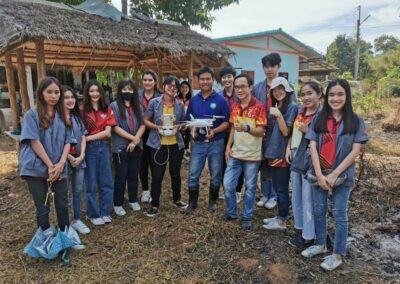Change Language: ภาษาไทย
Bachelor Degree Programs
Sustainable development technology
ภาษาไทย ภาคปกติ
ระยะเวลา: 4 ปี
จำนวนรับเข้า: 45 คน
คุณสมบัติผู้สมัครเข้าศึกษา:
- ผู้สมัครต้องเป็นผู้สำเร็จการศึกษาชั้นมัธยมศึกษาปีที่ 6 สายสามัญ กลุ่มสาระการเรียนรู้วิชาวิทยาศาสตร์ ฟิสิกส์ เคมี ชีวะ ต้องเรียนรายวิชาพื้นฐานและรายวิชาเพิ่มเติม รวมกันไม่น้อยกว่า 22 หน่วยกิต กลุ่มสาระการเรียนรู้คณิตศาสตร์ต้องเรียนรายวิชาพื้นฐานและรายวิชาเพิ่มเติม รวมกันไม่น้อยกว่า 12 หน่วยกิต
จำนวนหน่วยกิต:
- จำนวนหน่วยกิต รวมไม่น้อยกว่า 138 หน่วยกิต
- วิชาศึกษาทั่วไป 30 หน่วยกิต
- วิชาเฉพาะ ไม่น้อยกว่า 102 หน่วยกิต
- วิชาเลือกเสรี ไม่น้อยกว่า 6 หน่วยกิต
ค่าเล่าเรียน:
- ภาคการศึกษาละ 17,300 บาท (เหมาจ่าย)
สถานที่ศึกษา:
คณะวิทยาศาสตร์และเทคโนโลยี มหาวิทยาลัยธรรมศาสตร์ ศูนย์รังสิต
ติดต่อหลักสูตร:

Multiple sciences, innovations and application of the scientific initiatives of His Majesty the King for sustainable development.
Program Description
The Sustainable Development Technology program applies the science of His Majesty the King and the Sufficiency Economy Philosophy as the foundation for the development of the program with integration of knowledge in various areas such as civil works and city planning, geo-information technology, agricultural systems and energy and environmental management. The knowledge and sciences of each field are applied to benefit local or community development and to build a foundation for the creation of new and essential innovations that are consistent with the contexts and needs of communities. In addition, skills in multiple sciences are proactively built to meet domestic and international labor demands in line with sustainable development goals (SDGs).
Upon graduation from this program, graduates will be able to work in the private sector, in state enterprises, or in the public sector in positions requiring personnel with knowledge and skills in four areas as follows:
-
Civil works and city planning.
-
Energy management.
-
Information technology (remote sensing, geographic information systems, local database systems).
-
Agricultural resource management.
Furthermore, management and integration subjects are available for skilled and proficient students in knowledge integration for systematic problem solving.
Internships or Cooperative Education
Students will receive opportunities for internships at leading organizations in the public and private sectors within the country and abroad that are part of the network of the Faculty of Science and Technology (internship takes place during the summer semester of the third year or at the end of the first semester of the fourth year) based on specialization to research four areas as follows:
- Civil works and city planning
- Energy management
- Geo-information technology (remote sensing, geographic information systems, local databases)
- Agricultural resource management
Further Studies
Graduates can pursue further studies in many fields related to the four subjects of civil works and city planning, energy management, geo-information technology (remote sensing, geographic information systems, local databases), and agricultural resource management.
Target Occupations After Graduation
Graduates of this program can pursue occupations in the public and private sectors in four areas as follows:
- Civil works and city planning
- Energy management
- Geo-information technology (remote sensing, geographic information systems local databases)
- Agricultural resource management
Examples include company employees, private business owners, government employees, state enterprise employees, and academic instructors or researchers in academic institutions.






